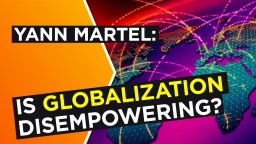Who wins and who loses from globalization? There are (at least) six answers

- Six dominant narratives attempt to answer the question, “Who are the winners and losers of globalization?”
- There is no single right answer; instead, different narratives tell different stories.
- The narratives revolve around (1) the establishment position, (2) left-wing populism, (3) right-wing populism, (4) the critique of corporate power, (5) geoeconomics, and (6) global threats.
The following is an excerpt from the book Six Faces of Globalization. It is reprinted with permission of the authors and Harvard University Press.
It is a confusing time, and our old mental models are increasingly unreliable guides to our complex and evolving reality. We are at a critical juncture: a relatively long period of stability in mainstream thinking about economic globalization has given way to a situation of dramatic flux. During such junctures, narratives assume particular relevance because they offer new ways for us to understand what the problem is and what should be done about it. Narratives provide the tools to contest the old normal and establish the contours of the new.
We are scholars of international trade and investment law who follow these debates intently, and the growing multiplicity of arguments about who wins and who loses from economic globalization reminded us of the confusion of a scrambled Rubik’s cube. The colors were all jumbled up, with each face representing an incoherent and confusing mix of arguments and concerns about trade, inequality, disintegrating communities, corporate power, public health, and environmental catastrophe.

Could we unscramble this Rubik’s cube? we wondered. Was there a way to arrange the different-colored pieces of the puzzle into coherent narratives, and to fashion a framework to show how these narratives relate to each other? Could this help us to better understand the political moment we found ourselves in and provide us with tools to analyze potential paths forward? As we disentangled the debates that had been playing out in the Western media, six prominent narratives about the winners and losers from economic globalization emerged, which we conceptualize as existing on the six faces of the Rubik’s cube.
The top face of the cube: everybody wins
According to some economists, if you think that globalization impoverishes countries and destroys communities, you have it all wrong. Sure, you may have lost your job because workers in other countries are paid less, but that is not at all different from losing your job because workers in the factory next door are more efficient or because technological progress has rendered your skills obsolete. The market is simply doing its work. You should improve your qualifications to get a better job; in the meantime, you still benefit from globalization since it gives you access to cheaper products. The process of adjustment may be hard at times, but it is a short-term cost that we have to accept in the interest of long-term prosperity. The end result will be a more efficient economy, lower prices, and more abundant consumer choice.
In this view, the pushback against economic globalization by people who feel that they have lost out is simply a natural reaction to the creative destruction that necessarily accompanies progress. The appropriate response is to help individuals adjust to the competition unleashed by globalization by offering them retraining and allowing them to share in the gains from trade. Adjustment assistance that eases workers into new jobs not only helps to realize the efficiency gains derived from the reorganization of the international division of labor but also is a political imperative, since it shores up public support for international integration. The bottom line is that the economic gains from trade more than suffice to compensate anyone who may have lost out, so that everyone can ultimately benefit from free markets and liberal trade.
We call this “everybody wins” view the establishment narrative, because it was the dominant paradigm for understanding economic globalization in the West in the three decades following the end of the Cold War. The view reflected a consensus of the main political parties in most Western democracies and beyond, and it has been espoused by many of the institutions that serve as the guardians of the international economic order, such as the World Bank, the International Monetary Fund (IMF), and the WTO. Many powerful actors still endorse this narrative, arguing that free trade not only increases prosperity but also supports other goals, such as promoting peace. Since the establishment narrative has been ruling the world and also represents the sunniest view of globalization, we visualize it as situated on the top of the cube.
The four sides of the cube: winners and losers
The establishment narrative now finds itself besieged from all sides. Concerns about the impact of free trade on workers and the environment have bubbled up previously, but discontent with economic globalization tended to be suppressed in mainstream circles in the West. In the decade following the global financial crisis, however, narratives that highlight how economic globalization produces both winners and losers have re turned to the center of political debate. These currents have pushed us off the sunny top of the cube, over the edges, and down to the four faces on the cube’s sides. Instead of relatively limited squabbles between the center-left and center-right on whether, when, and how to redistribute the gains from trade, we now confront four narratives that present a much more fundamental challenge to the assumptions underlying the establishment perspective.
The establishment narrative looks at the world economy as a whole and treats countries as the relevant actors; it is at these levels and units of analysis that the superior efficiency of a global division of labor in which every country focuses on its comparative advantage is most apparent. The narrative emphasizes absolute rather than relative gains, and the metric it employs is economic, typically gross domestic product (GDP). Proponents of the four challenger narratives do not necessarily contest that economic globalization has produced absolute economic gains at the aggregate level, whether measured nationally or globally. However, they focus on the distribution of those gains, both within and across countries, and derive much of their energy from channeling the disappointment, fears, and anger of the losers. Where these four narratives differ from each other is in which actors they identify as having won or lost, and in why they think it matters.
On the left of the political spectrum, we see two narratives that emphasize how gains from economic globalization have flowed upward to rich individuals and multinational corporations. The left-wing populist narrative focuses on the ways in which national economies are rigged to channel the gains from globalization to the privileged few. Proponents of this narrative point out that even as countries have seen their GDPs rise, many have also experienced a sharp increase in inequality, with a growing divide between rich and poor and a hollowing out of the middle class. Left-wing populism expresses itself in vertical hostility; its proponents stand up for the ordinary people who have lost out to the corrupt elite. Whereas some proponents point the finger at chief executive officers (CEOs), bankers, and billionaires (the top 1 percent), others take aim at the educated professional class and the upper middle class more broadly (the top 20 percent). Wherever the line is drawn, however, left-wing populists agree that the middle class, the working class, and the poor have lost out.
Instead of singling out domestic elites, proponents of the corporate power narrative argue that the real winners from economic globalization are multinational corporations, which can take advantage of a global marketplace to produce cheaply, sell everywhere, and pay as little in taxes as possible. These companies use their power to shape international rules in areas that advantage them, such as trade and investment, while lobbying against effective international cooperation on subjects that might disadvantage them, such as taxation. In this way, multinational corporations manipulate the network of domestic and international rules to maximize their profits and minimize their responsibilities. According to the corporate power narrative, economic globalization produces many losers—workers, communities, citizens, even governments—but only one winner: corporations.
Although both of these narratives focus on the upward redistribution of wealth, they differ in their emphasis. The left-wing populist narrative zeroes in on domestic problems, highlighting the explosion of inequality within countries. The corporate power narrative, by contrast, adopts a transnational approach and treats multinational corporations and the transnational working class as the key actors. The two narratives are often intertwined in places such as the United States and the United Kingdom, where many on the left are broadly critical of owners of substantial capital, whether individual or corporate. In many western European countries, by contrast, where levels of domestic inequality are lower, the corporate power narrative features more prominently, as was evident in the protests across Europe in 2015 and 2016 against the Transatlantic Trade and Investment Partnership (TTIP).
On the right of the political spectrum, we find two narratives about winners and losers that primarily see the gains from globalization flowing sideways to foreigners and foreign countries. In the right-wing populist narrative, workers, their families, and their communities lose from globalization, both economically and in a cultural sense. This narrative’s emphasis varies in different countries. In the United States, where the loss of blue-collar jobs to China and Mexico has devastated manufacturing communities, the narrative has a strong anti-trade element. In western Europe, anti-immigrant sentiment and concerns about a loss of sovereignty are central features of the narrative, whereas anxieties about the impact of international trade are less pronounced. In the United Kingdom, for instance, many of those who voted for Brexit did not oppose free trade; they rebelled against what they perceived as dictates from the EU institutions in Brussels and longed to regain control over immigration.
The right-wing populist narrative shares with the left-wing version a deep distrust of elites, but the two narratives part company on what they blame the elite for: whereas left-wing populists fault the elite for enriching themselves at the expense of the working and middle classes, right-wing populists denounce the elite for failing to protect the hardworking native population from threats posed by an external “other.” The right-wing populist narrative thus has a strong horizontal us-versus-them quality, whether expressed through concern about protecting workers from the offshoring of jobs or guarding them against an inflow of immigrants who might compete for those jobs, live off the welfare system, or threaten the native community’s sense of identity. The right-wing populist narrative also highlights geographical divisions within countries, such as the diverging fortunes of thriving cities and declining rural areas. For proponents of the narrative, these geographical divides map onto different value systems: rural areas are bastions for conservative cultural values such as stability, tradition, patriotism, and loyalty, whereas urban centers represent an untethered and amoral “globalism.” For proponents of the narrative, these cultural cleavages are more significant than divisions based on class or income per se.
The geoeconomic narrative also focuses on an external threat, but of a different kind: it emphasizes economic and technological competition between the United States and China as great-power rivals. Although both countries have gained from economic globalization in absolute terms, in relative terms China has closed the gap on America. Concerns about the interplay of economic security and national security have waxed and waned over the years; the United States treated the Soviet Union as a security threat during the Cold War and Japan as an economic competitor during the 1970s and 1980s. But the United States increasingly perceives China as both an economic competitor and a security threat, lending the geoeconomic narrative an urgency that it did not have during the Cold War. Although the narrative features most prominently in America, it is gaining ground in other Western countries as well, where China is increasingly regarded as a strategic competitor and a potential security threat rather than merely as an economic partner. Instead of applauding trade and investment as enhancing economic welfare and increasing prospects for peace, the geoeconomic narrative emphasizes the security vulnerabilities created by economic interdependence and digital connectivity with a strategic rival.
Although both the right-wing populist and geoeconomic narratives emphasize external, horizontal threats, they differ in key ways. The former focuses on cultural as well as economic losses, while the latter is more mindful of relative economic power of countries and its capacity to undergird political and military power. The former primarily laments the loss of the manufacturing jobs of the past, while the latter focuses on winning the race in the technologies of the future, such as fifth-generation (5G) networks and artificial intelligence. And the former targets Polish plumbers who undercut local workers, whereas the latter casts a critical eye on Chinese scientists and engineers who might steal Western technology.
The bottom face of the cube: everybody loses
The narratives we have discussed so far assume either that everyone wins from economic globalization (the top face) or that economic globalization produces both winners and losers (the four faces on the sides). By contrast, on the bottom face of the Rubik’s cube, we locate narratives that see all of us as at risk of losing from economic globalization in its current form. These narratives portray economic globalization as a source and accelerator of global threats, such as pandemics and climate change. Some of these narratives focus on how global connectivity increases the risk of contagion, both of the viral and economic kind. Others warn that the skyrocketing carbon emissions associated with the global diffusion of Western patterns of production and consumption are endangering both people and the planet. These global threats narratives emphasize our common humanity; their proponents call for global solidarity and international cooperation in the face of common challenges.
Proponents of the global threats narratives start from the observation that everything is interdependent: our economic systems are located within our social and political systems, which in turn are embedded within our environmental ecosystems and planetary boundaries. According to these narratives, we need to redefine the goals of our economies to enable individuals and societies to survive and thrive within the limits of our planet. This can mean emphasizing resilience over efficiency in our supply chains and sustainability over profit-seeking in our economies. Unless we fashion a more sustainable and resilient global economy, they warn, we run the risk that everybody will lose. We will not lose equally, however: some people and some countries will suffer first or worst. Proponents of these narratives argue that we need to be attentive to these distributional questions, either for moral reasons (because we have an obligation to look out for those who are most vulnerable) or for instrumental reasons (because no one will be safe until everyone is safe).






